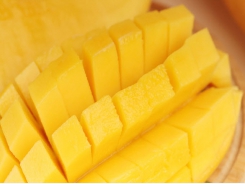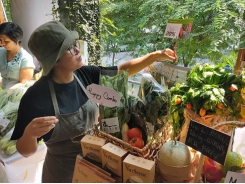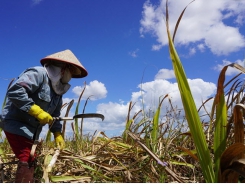Mekong flower farmers lessen Tet yield, brace for pandemic slump

Major bonsai and flower farms in Vietnam’s Mekong Delta have cut their output ahead of upcoming Lunar New Year, or Tet, by nearly half.
Huynh Van Tuan waters his Mexican marigold on his farm in Cho Lach District of Ben Tre Province in Vietnam's Mekong Delta, December 2020. Photo by VnExpress/Hoang Nam.
In the final days of December, the atmosphere in flower villages across Cho Lach District in Ben Tre Province is less bustling than normal.
Cho Lach is home to the second biggest bonsai and flower farm in Mekong Delta after Sa Dec Town of Dong Thap Province.
Just last December, the farm of around 3,000 square meters owned by Tran Van Phan, 47, had been swamped by 6,000 pots holding daisies meant for the Lunar New Year, which fell in late January. By the end of Tet, he had earned some VND150 million ($6,400) in profit.
"This year, I’m worried the pandemic would affect demand and cut the number of pots by half," Phan said.
Changing tactics, Phan has sourced nearby wholesalers instead of hiring porters to distribute his flowers and bonsai to other provinces.
Normally, bonsai and flower farmers in Mekong Delta deliver their produce to Ho Chi Minh City and nearby localities like Long An or Tay Ninh for sale.
In Cho Lach's Long Thoi Commune, Huynh Van Tuan, 32, said he is growing 3,000 pots of Mexican marigold that are around one month old in preparation for Tet, to fall in mid-February next year.
Last year, he grew as many as 5,000 pots for the occasion, the biggest holiday for Vietnamese when each family displays bonsai trees and flowers inside their homes as a wish for luck and prosperity.
"In previous years, owners in HCMC normally called from the ninth or the tenth lunar month to advertise their premises, hired by farmers from which to sell bonsai trees and flowers. But this year, I have not received a single call."
Also in Long Thoi Commune, Tran Van Au, 60, said he has reduced the scale of his Tet production from 4,000 pots of daisies to only 3,500.
Along National Highway 57 that runs through Ben Tre Province and links with Vinh Long Province, few farmers or welders can be seen making replicas of the 12 animals of the Vietnamese zodiac for Tet, many saying they’d rather play it safe and sell kumquat trees.

Farmer Tran Van Au waters his daisies in Cho Lach District of Ben Tre Province in the Mekong Delta, December 2020. Photo by VnExpress/Hoang Nam.
After 20 years’ growing flowers, Nguyen Thanh Son from Long Hoa Ward of Binh Thuy District in Can Tho City said he has reduced his production scale by 30 percent to just 2,000 pots for this Tet.
"I’ve studied the market and seen the amount of flowers sold during major events over the year has dropped by half due to the pandemic," he told Dan Toc newspaper, managed by the Committee for Ethnic Minority Affairs.
In a September report, Nguyen Hoang Vo Mong Kha, a flower and bonsai farmer of Sa Dec Flower Village in Sa Dec Town of Dong Thap Province, told the provincial news site that so far this year, his business had been "hit real hard."
"Ever since the second wave of community transmissions [which hit in late July and August], there has been a serious drop in the number of wholesale buyers," he stated.
The village used to draw many visitors and buyers each day but so far this year, it has taken nearly a week for some to stop by, Kha said, adding the price of flowers and bonsai, following falling demand, had decreased by 15-20 percent since last year.
Related news
Tools

Phối trộn thức ăn chăn nuôi

Pha dung dịch thủy canh

Định mức cho tôm ăn

Phối trộn phân bón NPK

Xác định tỷ lệ tôm sống

Chuyển đổi đơn vị phân bón

Xác định công suất sục khí

Chuyển đổi đơn vị tôm

Tính diện tích nhà kính

Tính thể tích ao



 HAGL to sell stake in agriculture subsidiary
HAGL to sell stake in agriculture subsidiary  Sugar producers accuse Thai firms of dumping
Sugar producers accuse Thai firms of dumping